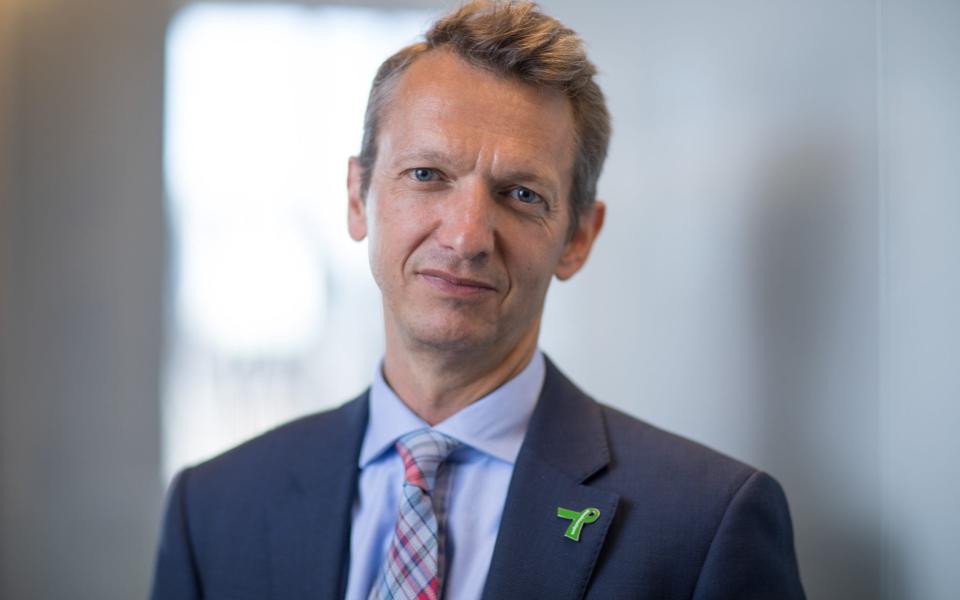Andy Haldane steps down as Bank of England chief economist

Andy Haldane is stepping down as the Bank of England’s chief economist after more than 30 years at the central bank, ending the tenure of one of its most outspoken voices.
He will become chief executive of the Royal Society for Arts, Manufactures and Commerce (RSA) in September.
Through the pandemic Mr Haldane has been among the most optimistic economists, predicting a sharp recovery for the UK and recently describing the economy as “a coiled spring” ready to rebound.
His enthusiasm includes mocking gloomier forecasters. In the autumn he compared downbeat analysts to “Chicken Licken” - a reference to the folktale of the bird who believes the “sky is falling” after an acorn drops on its head - warning that pessimists risk dragging down the economy.
This confidence in Britain’s potential to recover means he has become the Bank’s leading hawk, as economists call those who tend to favour higher, rather than lower, interest rates.
“Haldane’s departure means the Bank of England is losing its major – and maybe only – current hawk,” said James Smith, economist at ING.
“In theory, at the margin this tilts the committee towards a more favourable view on negative interest rates if more stimulus were needed, though we still think this is unlikely.”

The Yorkshireman has expanded the role of chief economist far beyond its more traditional focus on monetary policy and the macroeconomy.
Productivity, regional inequality, technology and business management are all on his agenda, as are more eye-catching and esoteric topics.
Among his more startling speeches was a 2018 presentation to King’s Business School in which he said individuals’ Spotify playlists could be a vital source of economic intelligence.
“Data on music downloads from Spotify has been used, in tandem with semantic search techniques applied to the words of songs, to provide an indicator of people’s sentiment. Intriguingly, the resulting index of sentiment does at least as well in tracking consumer spending as the Michigan survey of consumer confidence,” he said.
“And why stop at music? People’s tastes in books, TV and radio may also offer a window on their soul. So too might their taste in games.”
Bank insiders indicate Mr Haldane’s departure is entirely amicable.
Heading the RSA will allow him to expand his research and public policy proposals far beyond those at the Bank, even after his efforts to stretch the remit of the chief economist.
One source who knows Mr Haldane well said: "He is keen to be able to say more, and on more subjects, than is possible for a Bank employee. The RSA is a great platform."
The move is likely to come with a significant pay cut as the chief economist foregoes the opportunities that might have come with a move to the private sector, instead choosing to head a charity.
Mr Haldane earned a salary of more than £190,000 at the Bank of England in 2019-20, according to its annual report, plus benefits of more than £15,000, and pension contributions.
The RSA’s outgoing chief earned no more than £130,000 in 2019.

The 52-year-old’s long history at the Bank means he has been a part of key epochal changes.
He joined the Old Lady of Threadneedle Street in 1989, witnessing innovations including the start of inflation targeting in the early 1990s, and the Bank’s independence in 1997.
Mr Haldane served as executive director for financial stability from 2009 as the shocks of the financial crisis still surged through the economy.
In subsequent years the Bank restructured to take on a greater role monitoring and managing financial stability, before he became chief economist in 2014.
“This is an historic moment for our societies, with new challenges from technology to longevity, from inequality to the environment,” said Mr Haldane.
“Meeting these new challenges will require new thinking, new policies and new partnerships between governments, industries and civil society, working in partnership. The RSA is the institution best placed to tackle these challenges.”
Andrew Bailey, the Bank’s Governor, called Mr Haldane “an exemplary public servant” as well as “an imaginative and creative thinker on the wide range of issues the UK economy faces”.

 Yahoo Finance
Yahoo Finance 